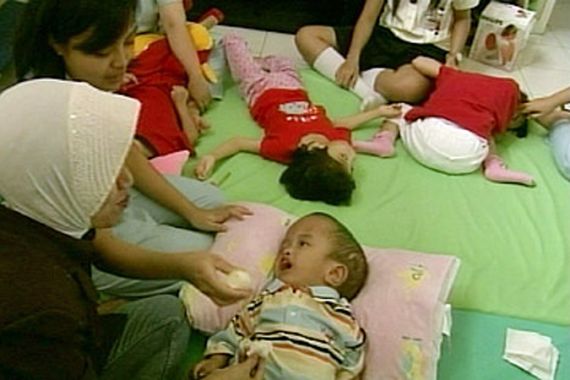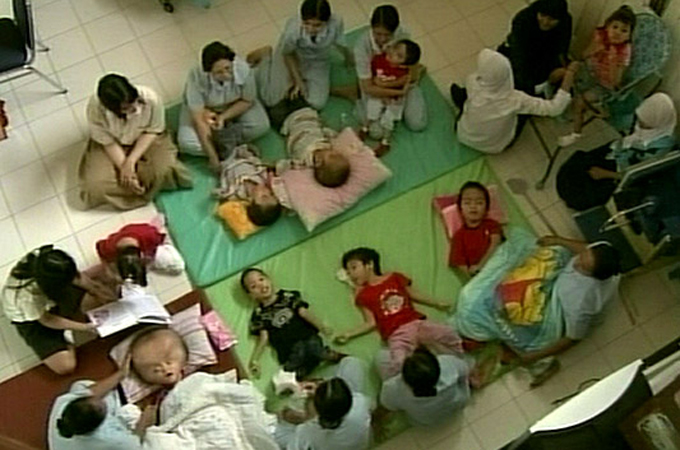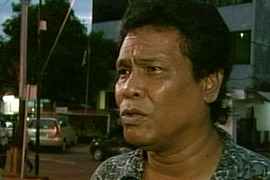Indonesia’s abortion victims
Children who survive botched operations suffer painful consequences.

 |
|
Most of the 14 children at the Sayap Ibu Foundation orphanage were disabled through failed abortions |
Despite tough anti-abortion laws in Indonesia, an estimated 1.3 million women have them each year, sometimes with painful consequences.
Most of them are done illegally – some by doctors, others by traditional healers using herbal remedies and vigorous massage – because abortion is only permitted to save a mother’s life.
 |
| Doctors do not expect 4-year-old Berti to see his 11th birthday |
Four-year-old Berti is an example of what can happen when an abortion is performed on the black market.
He survived the attempt, but got hydrocephalus – a condition causing spinal fluid to swell his brain.
It has made him deaf and blind and doctors say he will be lucky to see his 11th birthday.
Nurse Dumi says he has grown attached to her like she is his mother and cries when she takes holidays.
Trusti Moleyono of the Sayap Ibu Foundation says most of the 14 children living in its Jakarta orphanage were disabled through failed abortions.
She says Berti’s mother did not want to have a ninth child, but since her life was not at risk she could not get it done legally.
So she went to a traditional healer instead, who gave her a special massage. It did not work – so the woman abandoned Berti after giving birth at the hospital.
Back alley clinics
| Tough abortion laws |
|
Not allowed in cases of rape or incest, or to preserve a woman’s physical or mental health Doctors face up to 15 years in prison if caught; the woman up to 4 years Estimated 1.3 million abortions each year, says Indonesia’s Planned Parenthood Association Almost all are backstreet jobs done by doctors or traditional healers |
Although abortion is illegal it is common knowledge in Jakarta that if you want one you should go to a particular street in the centre of the city.
If you fit the right profile, an agent for an abortion clinic will soon approach. It is a secretive business and most of those involved were too scared to talk on camera.
But as darkness fell, Zef Tutupoly, an abortion agent, agreed to an interview – revealing the type of women he directs to one of the four abortion clinics nearby.
“Not just high school students but people with families; they have like five or six children and they don’t want to continue with their pregnancy because of economical problems so they come here to have an abortion, because they’re already screaming ‘we can’t feed our children anymore’,” he says.
He says the cost varies depending on the stage of pregnancy and patient’s economic circumstances but it can be as low as $100 or as high as $1000.
Deformed babies, dead mothers
 |
| Zef says some women are driven to abortion by economic considerations |
Zef says the abortions are safe, but Dr Ramona Sari says many black market abortions are dangerous and result not only in deformed babies but also dead mothers.
“Please try to understand, we as a woman sometimes we find unwanted pregnancies and we need to have safe abortion to save our lives,” she says.
A director at the Indonesian health ministry says he hopes new laws will be introduced within a year to allow abortions for rape victims or to preserve a woman’s mental or physical health.
But the amendments have already been under discussion for three years and there is no guarantee they will be passed in parliament.
Professor Agus Purwadianto of the health ministry says “the process of turning a bill into law is slow”.
“Plus there is a conflict of interest between the conservative and modern ideas.”
While the abortion debate goes on, it is being left to groups such as the Sayap Ibu Foundation to continue caring for some of the victims.